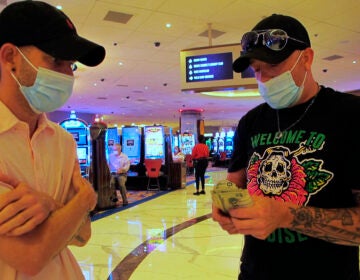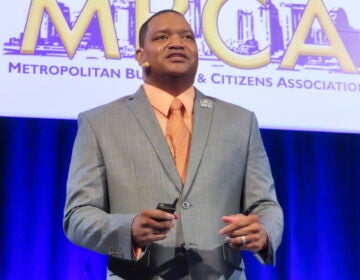A push to teach gamblers which sport betting sites are legal
Conscious Gaming began state-specific campaigns in New Jersey and Pennsylvania, where research shows many customers are confused about what is a legal gambling site.

This Sept. 5, 2019 photo shows a gambler making a sports bet at Bally's casino in Atlantic City N.J. (AP Photo/Wayne Parry)
A gambling industry group wants to teach consumers how to tell if a particular sports betting or online casino site is legal or not.
Conscious Gaming, a nonprofit group associated with an online gambling technology firm, launched its Bettor Safe campaign this week to promote the advantages of licensed gambling sites, including consumer practices, and highlight the risks of unlicensed ones, including identify theft, or the outright theft of deposits.
It also began state-specific campaigns in New Jersey and Pennsylvania, where research shows many customers are confused about what is a legal gambling site. Additional state-specific efforts are planned soon.
“This campaign comes at a pivotal moment when American sports fans are gearing up for the NCAA basketball tournament amid a pandemic that continues to push individuals online,” said Seth Palansky, a vice president with the group and a former online gambling executive with Caesars Entertainment. “Now more than ever we must educate consumers and equip them with the tools to make more informed decisions about online betting.”
Nationwide, 35% of individuals are unaware whether online betting is legal in their states, and many more, deceived by illegal operators, are wagering on unregulated sites, according to the American Gaming Association national trade group.
A recent survey by Conscious Gaming polled more than 500 adults in New Jersey and Pennsylvania on their habits and attitudes toward online betting. It found more than 25% of respondents in New Jersey and more than 30% of respondents in Pennsylvania were unaware if online betting is legal in their state, or responded that it was not legal.
Kevin O’Toole, executive director of the Pennsylvania Gaming Control Board, called the campaign “an important resource to empower consumers.”
The survey also found about 75% of New Jersey and Pennsylvania respondents could not differentiate a legal betting site from an illegal website.
The campaign’s New Jersey website, for example, offers a list of all the legal sports betting websites approved by the state Division of Gaming Enforcement.
It also offers a list of things people should look for to help determine whether a particular site is legal or not, including two New Jersey-centric logos for responsible gambling and for the gaming enforcement division.
It asks customers whether a significant amount of information is being sought during registration, saying unlicensed sites typically don’t ask for as much as legal sites do.
And cryptocurrency is not legal for online gambling in New Jersey; any site that accepts it is automatically an illegal site, according to the campaign.
Conscious Gaming is an independent group created by GeoComply, whose technology is widely used in the online gambling industry to verify the physical location of a gambler to comply with state laws.
WHYY is your source for fact-based, in-depth journalism and information. As a nonprofit organization, we rely on financial support from readers like you. Please give today.






